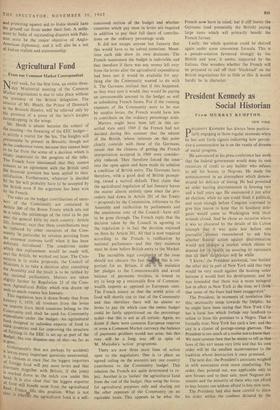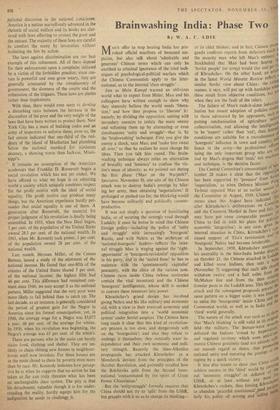President Kennedy as Social Historian
From MURRAY KEMPTON
NEW YORK
pRESIDENT k(ENNEDY has always been particu- larly engaging in those regular moments when he has sent forth signals indicating how percep- tive a commentator he is on the vanity of dreams of social progress.
He announced at his press conference last week that the federal government would deny its vast resources of credit to any builder who refuses to sell his houses to Negroes. He made the announcement in an atmosphere which demon- strated his delicacy of timing. He had promised an order barring discrimination in housing two and a half years ago. He announced it just after an election, when no one could think it political, and soon enough before Congress convened to give him reason to hope that its Southern dele- gates would come to Washington with their wounds closed. And he chose an occasion where it was so obscured by the details of his Cuban triumph that it was quite late before one journalist present remembered to ask him whether federal action against discrimination would not depress a market which claims to depend for its health on assuring its customers that all their neighbours will be Mate.
I know,- the President answered, 'one builder
the other day in part of New York said that they would be very much against the housing order because it would hurt his development, and he was reminded that there was a more stringent law in effect in New York at the time, so I think that some of the fears had been exaggerated.'
The President, in moments of revelation like
this, necessarily tends towards the Delphic. So he might have been saying that New York City has a local law which forbids any landlord to refuse to lease his premises to a Negro. That is formally true; New York has such a law; and the city is a cluster of postage-stamp ghettoes. The President is too much of a realist not to know that.- We must assume then that he meant to tell us that- laws of this sort mean very little and that his own order will be the smallest inconvenience to the tradition whose destruction it once promised.
The next day, the President's assistants weighed in with assurances even more comforting. The order, they pointed out, was applicable only to new houses and to their sale; most Negroes are tenants and the minority of them who can afford to buy houses can seldom afford to buy new ones.
The President had also been careful to place his order within the confines dictated by the .national discretion to the national conscience. _America is a nation marvellously advanced in the ,rhetoric of social welfare and its books are clut- tered with laws affecting to protect the poor and the outcast. The majority of these laws are careful to comfort the many by invocation without bothering the few by action.
The laws against discrimination are our best example of this refinement. All of them depend for their enforcement upon a complaint initiated by a victim of the forbidden practice; since cus- tom is powerful and men grow weary, they are generally attenuated by the complacency of government, the slowness of the courts and the exhaustion of the litigants. These laws are pieties rather than implements.
With time, there would even seem to develop a disturbing ratio between the increase in the discomfort of the poor and the very weight of the laws that have been written to protect them. New York City has a mass of building codes and an army of inspectors to enforce them; even so, the last census indicated that one-third of the resi- dents of the island of Manhattan had plumbing below the national standard for minimum decency, a showing worse than Jackson, Missis- sippi's.
It remains an assumption of the American academies that Franklin D. Roosevelt began a social revolution which has not yet ended. We have offered to what we hope is an admiring world a society which uniquely combines respect for the profit motive with the ideal of social equality. The profit motive can produce many things, but the American experience hardly per- suades that social equality is one of them. A generation after Roosevelt, the material for .proper judgment of his revolution is finally being assembled. In 1933, when the New Deal began, 1 per cent. of the population of the United States owned 28.3 per cent. of the national wealth. In 1961, when Mr. Kennedy took power, 1 per cent. of the population owned 28 per cent. of the national wealth.
Last month, Herman Miller, of the Census - Bureau, issued a study of the allotment of the national income. He found that one-fifth of the citizens of the United States shared 5 per cent. of the national income; the highest fifth had 46 per cent. This difference had remained con- stant since 1944; we may accept it as the national pattern. Miller suggested that the very poor were more likely to fall behind than to catch up. The last decade, as an instance, is generally considered the period of greatest gain for the Negro in America since his formal emancipation; yet, in 1960, the average wage for a Negro was $3,075 a year, 60 per cent. of the average for whites. In 1950, when his revolution was beginning, the Negro's average was 61 per cent. of the white's.
There are persons who in the main can barely claim food, clothing and shelter. They are un- likely to claim shining new houses in neighbour- hoods until now inviolate. For those houses are in the main closed to them by poverty even more than by race. Mr. Kennedy indicates how percep- tive he is when he suggests that no action he has taken so far can truly threaten what has been an unchangeable class system. The pity is that his detachment, valuable though it is for under- standing the reality, hardly equips him for the indignation he needs to challenge it- t.







































 Previous page
Previous page